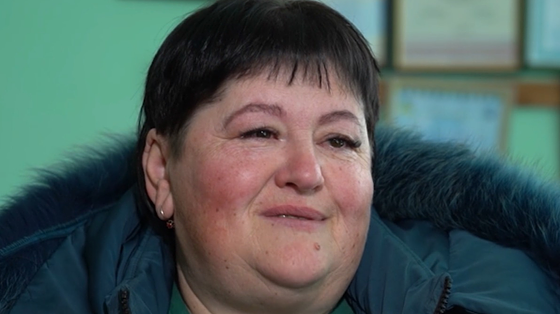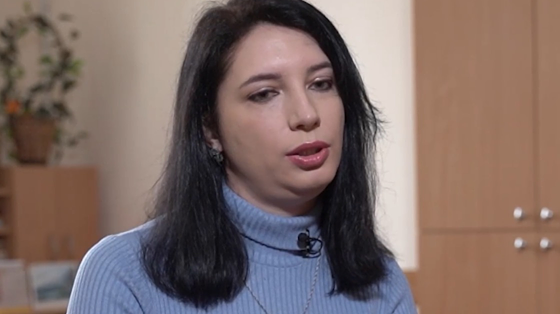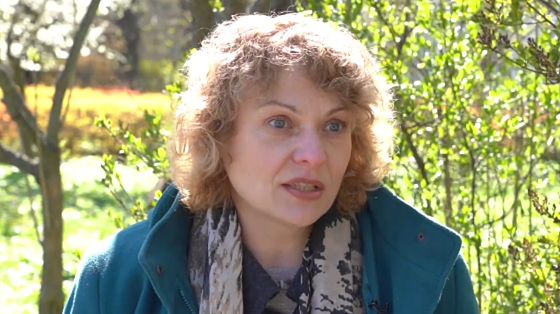I was born in a city surrounded by waste lands, steppes, and mines. It may not sound as romantic as one would like, but it's definitely the most beautiful city in the world for me.

Peaceful life in the City of Roses
Donetsk always had a lot of roses. Lenin Square, the entire Artema Street, Scherbakov Park, Donbass Arena - they all have various flower beds: red, white, pink, roses with open buds, long-stemmed, live; roses made of metal in the Park of Forged Figures are collected in the flower composition 'Donetsk' by the miner monument. Even painted roses, depicted on billboards to honour the City Day in late August.
My city of roses has always been nice and cosy. It had everything: entertainment, calmness, day-to-day activities, nature, hustle and bustle of the city, good people. There were never any traffic jams; summer was very hot; winter was moderately cold and snowy; spring was early; autumn was rainy.

I had lived there for the first nineteen years of my life before moving to Kharkiv and later to Kyiv. I have a small family. Mother, younger brother (12 years old), stepfather and grandmother. My father died when I was ten. I finished secondary school and two courses of university In Donetsk. I came to known all the joys and feelings of adolescence. I have made my first friends here, too. I grew up and came of age here. I would have stayed there if it hadn't been for the circumstances…
What is war?
For me, a war is something that seemed very far away and something that is definitely not from this century. It is something I read about in history class and didn't think much about. I changed my opinion dramatically after the year of 2014.
War is a spontaneous gathering and moving to another city; it's a sideways glance in your direction; it's when you talk less about your registration; when you can't find an apartment; when you do additional transfer work to a new university; when you worry about all your friends and try to collect some information about those you know.
War is when you return to your hometown after two years and see buildings destroyed, windows boarded-up. You see military men and devastation.
War is death, isolation, blood, minefields, curfews, hatred, resentment, and sadness.
I encounter war in May 2014, when the first civil disturbances began. My mother, who was worried about this situation, sent me to the seaside for the whole summer. I didn't take it seriously then. I was glad of this trip, not knowing that I would not get home for another two years. The days passed quickly, and I could hear my mother's agitation increase on the phone. I realised that everything was bad when in early August 2014, my mobile was disconnected in Crimea, and I dial my mother for two days.
I realised the irreversibility of the situation when I was sitting on the train to Kharkiv, where my family sent me with the words,
"You need to transfer there. Everything is just beginning here." Then I felt what real fear is. Fear of what will happen. Fear of the unknown. Fear for my family, who stayed there.
"Eastern registration"
I lived in Kharkiv for two years with my younger brother, boyfriend and grandmother. It was very difficult to find an apartment. No one wanted to take people with "Eastern registration."

Here I felt resentment and anger for the first time, "Am I to blame for being born there? Does my registration describe me as a person?" The apartment was found only thanks to my mother's acquaintance.

I wanted to shout out loud, "People, wake up! Where is your sanity and humanity?"
Apart for feeling indignation, I alsp felt rage and anger. I wanted, really wanted, all these people would step in my shoes. And then I would ask,
"Well? Do you like it? What do you think? How does it feel to be hated and despised by everyone around you?" But the anger passed, and it was replaced by a sense of shame for their thoughts and sadness.
My mother took us all out and returned to Donetsk. She still had work there which helped feed us.
When my friends often asked me why my parents wouldn't leave, it was hard for me to explain everything. How can you explain to people that work there is more profitable, that you can't bring her here because money will be less and life will be harder. And again 'people with east registration ' are not employed easily.
Life during bombing
My mother visited us every weekend. Each. She stood in 12-hour queues at checkpoints, quarrelled with the military, sometimes she could not leave in time– and the checkpoint closed right in front of her car. She was wearing herself out, but our love moved her. She didn't care how much time she spent on the road. She valued every minute spent with her family.

My mother told me terrible things about the house. Then the worst began. 2014 - 2015 were the climax of the military actions. And my mother was in the middle of it. We live in Kyivskyi District, which was five or six kilometers from the airport.

During the bombings, she often ran to the bathroom and sat there while the walls of the house were shaking heavily.
One morning, a hole formed in the neighboring yard – a shell flew there at night. A woman and her child were killed at a bus stop near her work – the area of the former Moscow Grocery Store.
She spent weeks sleeping in the office. Sometimes she would rent an apartment in areas remote from the armed hostilities. It is noteworthy that it is at this time that people remember what it is like to be courageous and be a human.
Saving my favourite ginger
I have a cat. A fat, red-haired cat aged eight. He survived this period thanks to my mother.
My mother was always against pets at home, but the cat was given to me, so she had to put up with it. But when a person sees a danger to life, he or she never thinks but acts. On one of the days of the worst bombing, my mother got out of work (city center), got in the car and went home. Sam (the cat) was still there – we had to pick him up.

The military blocked the road at Kyivskyi Prospect, "We can't go any further. They're bombing. It is dangerous." But you don't know my mother. The military didn't know her either.
"I don't care. Let me pass,I have a cat left at home. He is alone there. I need to pick it up." The military laughed, but you can't mess with my mom.
The words "It's dangerous. What cat are you talking about? Think of yourself!" were not enough. My mom had to pick up our pet. "I won't leave him there alone. He's a family member, how can you not understand?" Finally mother was allowed to go with the words "Let her pass, let her go."
When she went into the apartment, a terrified Sam immediately jumped into her hands. Animals always feel our care and love, and they are very grateful to us for this. Mom quickly packed up all the necessary things and took Sam to work. They stayed there for another week. Then my mother brought him to Kharkiv, to me.
I love this story because it shows that even the most terrible and dangerous moments of life show a person's best qualities and true moral values. I am grateful to my mother for this. I think Sam is grateful, too.
"Natural" nightmare
A shell hit the supermarket where we went to buy food every week.

Windows of the neighbouring house broke. Tanks drove through the center of the city.
My mother told me these and many other facts every day when we called each other. She told me that reflexively as if it was normal.
Then I realized that a person can adapt to everything. It's hard to surprise or frighten my mother right now. And what could be worse than war?
Cruel jokes
I lived a calm life in Kharkiv. People treated me differently. Someone was sorry for me, because my usual way of life and my familiar things changed. Someone supported me by saying that everything would get better. Someone did not care. Others would argue and hurt me. Many people liked to joke, calling me a separatist which, in its turn, triggered anger in me.
Deep down I knew it was just a joke. But, as they say, many a true word is spoken in jest. A joke has to rest on something evident. I was wildly offended back at that time. People tend to colour everyone with the same brush. They did not care what I thought, what was important to me, what values I cherished. I was born in Donetsk, but that does not mean that I am a separatist.
It made me grow a thick skin. I still do not watch the news, do not read articles, I do not want to hear the same words, "we need to gather all those who could not leave and throw a bomb on them." For what? That older people who worked all the time for their country, and they do not have the physical and material opportunities to leave? For the fact that people still have lucrative jobs, real estate, and, at the very least, for the fact that this is their home?
Even the dead cannot rest in peace
My boiling point was the situation that concerned my father's grave. He is buried in the 15th cemetery plot, near the Iversky Monastery and the airport.

We often went there with my mother. We cleaned the grave and brought new flowers. I looked at the photo on the tombstone and spoke to him in my mind.
War not only affects the living, it haunts the dead, too. I was walking with a friend in a park in Kharkiv when my mother sent a Viber photo of my father's destroyed grave. The granite slab was broken into different sized pieces. I began to sob. I was feeling so hurt…
The photo was taken by dad's best friend, who took a chance on his birthday to come to the cemetery that was destroyed almost completely. And dad's grave was not even ruined completely. The burial site itself remained intact. Only the outer part was damaged. Many graves were in much worse condition. Shells landed right in the grave pits. Bones were visible in some places, not to mention the unsafe location and possible mining of the cemetery.
My mother said we wouldn't be able to visit the cemetery for another ten years. My father's grave will remain like this for ten years. I won't be able to go there, sit and honour my father for another ten years. This memory is one of the most tragical for me.
"No weapons"
It was the first time I'd come home in two years. I was able to persuade my mother. But what I saw was completely out of proportion. There are checkpoints, military posts, "mine" signs, a burned-out bus in the 'grey zone,' untidy toilets, a lot of elderly people trying to leave or enter on the Mariupol highway that was once so familiar.

My mother said that the city was slowly coming back to life. Do you know how the sliding doors of the shopping center are marked with signs prohibiting entry with dogs or ice cream? So, the doors of the shopping center in Donetsk have only one ban - 'No weapons.' All the places where I spent my youth have been shut down. The world has completely turned upside down.
Bureaucracy
I wish to forget all this and live a normal life. I wish I did not to hear bad words addressed to me. And most importantly I wish that my family and people close to me were safe.
Let me provide an example. I got sick with bronchitis in Kharkiv. I was very ill and had a high temperature. I went to the state hospital at my place of residence. I went to the receptionist and asked if I could make an appointment with an ENT specialist on a first-come-first-served basis. They gave me a permission but asked for my passport. I gave it. Then they said, "Oh, you are from the ATO zone. To have a medical examination, you must have a certificate of migration." Fortunately, I had it. However, if I was dying, would people also need my certificate of migration?
I hold out the certificate, and they tell me, "Now you need to write an application and sign it with the chief doctor, so that she will allow us to be examined. Doctor's appointment hours are over for today. Please, come back tomorrow."

What else is there to say? Do you think this is normal, too? I am a sick person, I was ill, and I need to get PERMISSION to receive medical care, since I am from the ATO zone.
I made an appointment in a private clinic where I had to pay for the visit. However, no registration or passport was required.
Life without happiness
I work in Kyiv, live a calm life, but I feel depressed. I'm not happy. I sincerely believe that people need help. In particular, those who stayed there and are unable to leave, and those who were able to leave but can not live normally in a society that does not accept people 'with Eastern registration.'
I do not receive humanitarian aid, but I am very grateful to everyone who has provided it and continues to do that.
The worst thing about war is death. You can't bring a person back to life. It is terrible to see how people change, how their hearts harden, how their loved ones betray and condemn. It's scary when you can't see your loved ones when you want to.
My values have changed dramatically. Now I appreciate every day and moment spent with my family and my loved ones. I am happy with every call and photo sent by my mother. I appreciate every visit to Donetsk and the time I spent there. I try to live in the moment.
I dream of peace. I dream of the moment when I will finally be able to come home freely, hug my mother, feel safe and free. I dream of the moment when I will bring my friend there and show her all the glory of my city. I dream that I would visit my favourite places - sit in a cafe and not thing about the curfew.
That I would go to my father's grave and leave some flowers there. That I won't be afraid to step on a mine. I dream of the time with no weapons and military men, when people would hug me and not care about my registration.
I dream to see my loved ones safety and in good health. I sincerely believe and pray about this every day. I try to love people even more, not to think badly of everyone. I know that many people don't care where I come from, and many people love me for who I am. And I am very grateful for this and
this opportunity to speak out.




























.png)



